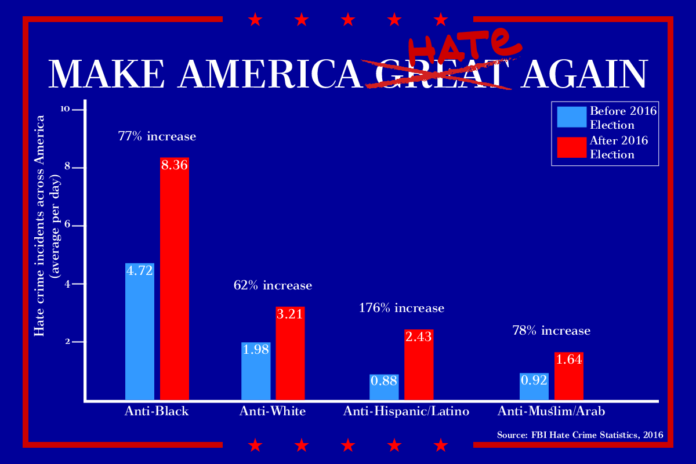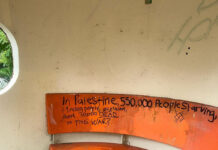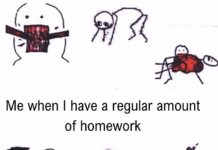Hate is here, it is at our front door. Communities that our students call home are being devastated by domestic terrorism, and we must take action.
On Saturday, Oct. 27, a domestic terrorist shot and killed 11 people at the Tree of Life synagogue in Pittsburgh, the deadliest attack on the Jewish faith in American history. Only days earlier, on Oct. 24, a gunman shot and killed two people in a Kentucky supermarket parking lot after reportedly failing to break into a predominately black church.
These acts of domestic terrorism reflect an abhorrent sense of white nationalism that we as a country, perhaps until recently, have chosen largely to ignore. Much progress has been made over the last century for marginalized groups in the United States, but events like these should remind us of hate’s daunting presence in this country.
Hate takes on many forms. You can find hate anywhere in America, from the use of racial slurs from one neighbor to another, to a hoard of people marching in solidarity for the extermination of minority groups as we saw in August of 2017 in Charlottesville, Virginia. Richard Spencer, America’s most prominent white nationalist, seeks to form a new “white nation” and has gained a disheartening amount of support for his movement.
Spencer himself credits President Donald Trump for facilitating the climate necessary for white nationalism to thrive in the United States. In his now infamous “Hail Trump” speech, Spencer gives his own twist on Trump’s campaign slogan that graces the clothing of many of his supporters.
“We [white Americans] were meant to overcome—overcome all of it,” Spencer said. “Because that is natural and normal for us. Because for us, as Europeans, it is only normal again when we are great again.”
Another supporter of the president recently sent at least 14 packages that contained homemade explosive devices to two former presidents, a former vice president, Trump’s 2016 general election opponent, the former director of national intelligence, the former director of the CIA, the former United States attorney general, several members of Congress and prominent members of the media. The only common connection between these individuals and organizations is their criticism of the president.
Divisive rhetoric from the president, in addition to other prominent individuals who share his vision for the United States, has advanced the fracturing of the American landscape along ideological lines. Inadequate and misguided reactions from opposition groups have only hardened the support of Trump’s radical base.
Hate crimes have increased during Trump’s brief time in office. Within the first two weeks of his inauguration, crimes targeted against black, Hispanic, Jewish and Muslim Americans took a sharp upturn. Each year since 2015, the beginning of the 2016 election cycle, hate crimes in the United States have continued to rise. While our president is not the cause of this hate, his rhetoric at the very least stokes the flames of bigotry that are present in our country.
It might seem like the Slippery Rock community is too small to be affected by incidents of violence carried out by domestic terrorists, but the Tree of Life Synagogue is only 57 miles south of SRU’s campus. Anthony Burke, a 2013 Rock graduate and Pittsburgh police officer, was injured by the domestic terrorist while responding to the shooting in Squirrel Hill. The terrorist posted “Screw your optics, I’m going in,” on a “free speech” social media network populated with racists, misogynists and white nationalists, only minutes before committing mass murder. He posted that on a site created right here in Pennsylvania.
Incidents like these are not isolated to major metropolitan areas. On Nov. 12, 2016, a group of multicultural students were shot with a pellet gun from a vehicle driving along South Main Street here in Slippery Rock. Racism is present in all corners of the United States and has been since the founding of our nation. Just because you only hear about it happening somewhere else does not mean that hate is not present in our own community.
It is evident to The Rocket editorial board that political and cultural leaders alike have been woefully inadequate in addressing, and sometimes have supported, the rising tide of racism and bigotry in the United States. Donald Trump has failed us. Our elected officials have failed us. Members of the media have failed us. And most of all, we have failed each other.
But it’s not too late.
Hate is something that cannot be solved overnight or with one swipe of ingenuity. The best way to combat hate is to understand its impact on those who are oppressed. Don’t just call out hate when you see it, but also recognize the role you may play in it. Every racist joke or angry exclamation is more than just the words you use; the associations and meanings behind them cause lasting harm.
It’s not just about what we say or how we act. It’s about how we think.
All of us have to consider where we want the national dialogue to go from this point. That starts right here, on our campus, in our neighborhood, in our commonwealth. If we do not have these conversations now, much of the progress that has been made will be undone.
We need to start by educating ourselves. Make the effort to attend events on campus that you would not normally attend. Use these opportunities to expose yourself to viewpoints that you are unfamiliar with. Consider the struggles of others, put yourself in the shoes of your fellow students who may not think like, look like or pray like you do.
When you encounter hate, acknowledge it. It may not be as obvious as you think. Challenge hate and do not be afraid to call it out. Do not disregard it and do not make excuses based on context.
We have to make the choice to end hate. No one else can make that choice for us.
In the absence of responsive leadership, it is up to us as a community to make positive change.






